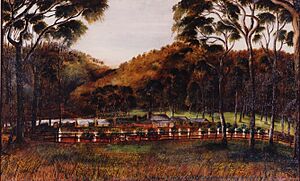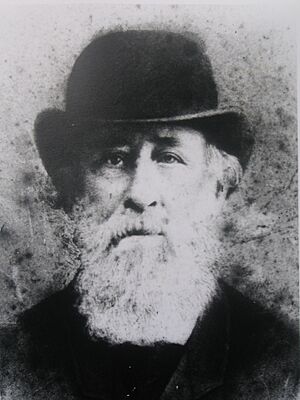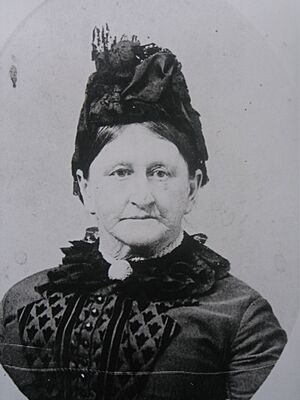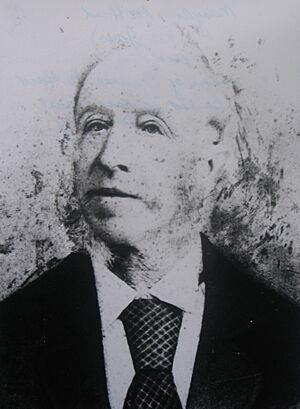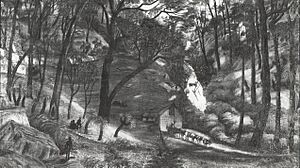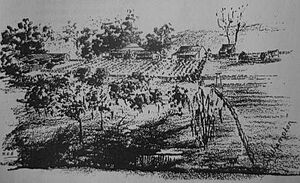Southampton homestead facts for kids
Quick facts for kids Southampton homestead |
|
|---|---|
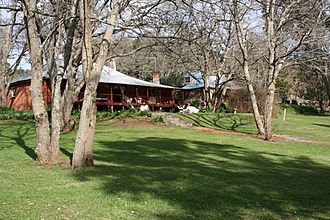
Southampton Homestead in 2006
|
|
| General information | |
| Type | Station |
| Location | Balingup, Western Australia |
| Coordinates | 33°53′17″S 115°58′19″E / 33.888°S 115.972°E |
| Reference no. | 710 |
The Southampton homestead was a historic farm building located in the south west of Western Australia. It sat on the banks of the Blackwood River. This old-style building was built in 1862.
Richard Jones and his two sons, Richard and William, built it. They made mud-bricks right there on the land. The building took two years to finish. This special old property is next to the Bibbulmun Track. It is about 12 kilometers south of Balingup.
When the farm was at its busiest, the Jones family managed a huge area of land. It was about 27,500 acres (111 square kilometers). The family and their workers grew wine, wheat, and fruit. They also raised about 600 cattle. The farm had many buildings. These included the main house, a kitchen, a flour mill, a dairy, and workshops. There were also brick kilns, a jetty, a boat shed, and homes for workers.
Sadly, the homestead was destroyed by a big bushfire in February 2013.
Contents
The Story of Southampton Homestead
Southampton Homestead got its name from the port city of Southampton in the United Kingdom. Richard Jones, his wife Louisa, and their five children sailed from Portsmouth in 1829. They came to Australia to find new chances in the Swan River colony, which is now Perth.
Early Days and Challenges
The Jones family arrived in 1829. They first bought land in the city of Perth. It was at the corner of St Georges Terrace and Barrack Street.
A sad event happened in 1830. Louisa, Richard's wife, passed away. She was the first European woman to die in the new colony. She was 29 years old. Her baby boy, Joseph, died three months later. Both are buried in the old East Perth Cemetery. Richard Jones was left with five children. He hired a housekeeper, John Allum, who was from Malaysia. John worked for the family for 40 years. He passed away at 83 and is buried on a hill near the homestead.
In 1855, Richard sold his city land for a lot of money. He used it to buy 10 acres (40,000 square meters) of new land. This land was on the Blackwood River, south of Balingup. He and his two sons, Richard and William, built a simple house there. This first house was made of wattle and daub. But a big flood from the Blackwood River destroyed it in 1860. The exact spot of this first house was only found in 2007.
Richard and Louisa's daughter, Mary McHard (1826-1912), became a widow in 1864. Her husband passed away in an accident in Perth. Mary and her four daughters came to live at the homestead in 1864. Her four daughters are the only direct family members who still have descendants. These family members live in Perth and the Southwest region of Western Australia today.
Richard Jones lived the rest of his life at the homestead. He lived with his two sons, William and Richard, and his daughter Mary and her children. Neither of his sons ever married, so they had no children to inherit the farm. Richard passed away in 1876 at 81 years old. His sons and daughter kept working on the property. William, Richard Jr., and Mary stayed there until 1903. In that year, William became very sad because his health and eyesight were failing. He then took his own life.
A New Chapter and the Fire
Over the next 50 years, Southampton Homestead was owned by many different people. It started to fall apart. In 1960, the Forest's Department bought it. They planted many pine trees (Pinus radiata) there. The property was mostly forgotten for 30 years. Then, in the late 1990s, people realized how important its history was. Plans were made to fix it up.
In February 2013, a storm caused lightning strikes. These started a serious bushfire in the area. Strong winds pushed the fire through the valley where the homestead was. Firefighters tried their best, but the fire burned the homestead to the ground.
Digging Up the Past: Archaeology
Archaeology is the study of human history through digging up old things. A team of 15 archaeologists studied the homestead site. They were from the University of Western Australia and the University of Notre Dame Australia. The Archaeological Society of WA also helped.
They started digging in June 2007. They wanted to learn more about the history of the site. They found the spot of the first homestead from 1860. They also found the location of the old mill. This mill was about 2.7 kilometers south of the homestead. There were seven buildings on the site originally. The archaeologists want to find where these buildings were. They also want to learn what they were used for and what they were made of. So far, there is only a little bit of proof left of most of them.
Protecting History: Heritage Status
The local community and the government really value this property. It has been given a special "triple-heritage listing." This means it is protected by local, state, and federal Australian governments.
A plan was made to protect the site. The first part of the plan was to save and fix up Southampton Homestead and the nearby Bakery Cottage. Most of this work was finished by 2002. The homestead is a good example of buildings from the mid-1800s. No early repairs had been tried on it. This was good because it meant the building's original materials were not damaged. This helped keep the building's history safe.
 | Valerie Thomas |
 | Frederick McKinley Jones |
 | George Edward Alcorn Jr. |
 | Thomas Mensah |


